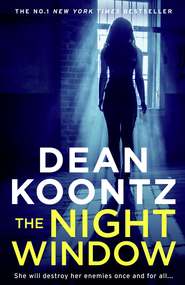По всем вопросам обращайтесь на: info@litportal.ru
(©) 2003-2025.
✖
Forever Odd
Автор
Год написания книги
2018
Настройки чтения
Размер шрифта
Высота строк
Поля
6
THE TREE OF DEATH STANDS ACROSS THE alley and down the block from the Jessup place, in the backyard of the Ying residence.
In the summer and autumn, the thirty-five-foot brugmansia is festooned with pendant yellow trumpet flowers. At times, more than a hundred blooms, perhaps two hundred, each ten to twelve inches long, depend from its branches.
Mr. Ying enjoys lecturing on the deadly nature of the lovely brugmansia. Every part of the tree—roots, wood, bark, leaves, calyxes, flowers—is toxic.
One shred of its foliage will induce bleeding from the nose, bleeding from the ears, bleeding from the eyes, and explosive terminal diarrhea. Within a minute, your teeth will fall out, your tongue will turn black, and your brain will begin to liquefy.
Perhaps that is an exaggeration. When Mr. Ying first told me about the tree, I was a boy of eight, and that is the impression I got from his disquisition on brugmansia poisoning.
Why Mr. Ying—and his wife as well—should take such pride in having planted and grown the tree of death, I do not know.
Ernie and Pooka Ying are Asian Americans, but there’s nothing in the least Fu Manchu about them. They’re too amiable to devote any time whatsoever to evil scientific experiments in a vast secret laboratory carved out of the bedrock deep beneath their house.
Even if they have developed the capability to destroy the world, I for one cannot picture anyone named Pooka pulling the GO lever on a doomsday machine.
The Yings attend Mass at St. Bartholomew’s. He’s a member of the Knights of Columbus. She donates ten hours each week to the church thrift shop.
The Yings go to the movies a lot, and Ernie is notoriously sentimental, weeping during the death scenes, the love scenes, the patriotic scenes. He once even wept when Bruce Willis was unexpectedly shot in the arm.
Yet year after year, through three decades of marriage, while they adopted and raised two orphans, they diligently fertilized the tree of death, watered it, pruned it, sprayed it to ward off spider mite and whitefly. They replaced their back porch with a much larger redwood deck, which they furnished to provide numerous viewpoints where they can sit together at breakfast or during a warm desert evening, admiring this magnificent lethal work of nature.
Wishing to avoid being seen by the authorities who would be going to and coming from the Jessup house during the remaining hours of the night, I stepped through the gate in the picket fence at the back of the Ying property. Because taking a seat on the deck without invitation seemed to be ill-mannered, I sat in the yard, under the brugmansia.
The eight-year-old in me wondered if the grass could have absorbed poison from the tree. If sufficiently potent, the toxin might pass through the seat of my jeans.
My cell phone rang.
“Hello?”
A woman said, “Hi.”
“Who’s this?”
“Me.”
“I think you have the wrong number.”
“You do?”
“Yes, I think so.”
“I’m disappointed,” she said.
“It happens.”
“You know the first rule?”
“Like I said—”
“You come alone,” she interjected.
“—you’ve got a wrong number.”
“I’m so disappointed in you.”
“In me?” I asked.
“Very much so.”
“For being a wrong number?”
“This is pathetic,” she said, and terminated the call.
The woman’s caller ID was blocked. No number had appeared on my screen.
The telecom revolution does not always facilitate communication.
I stared at the phone, waiting for her to misdial again, but it didn’t ring. I flipped it shut.
The wind seemed to have swirled down a drain in the floor of the desert.
Beyond the motionless limbs of the brugmansia, which were leafy but flowerless until late spring, in the high vault of the night, the stars were sterling-bright, the moon a tarnished silver.
When I checked my wristwatch, I was surprised to see 3:17 A.M. Only thirty-six minutes had passed since I had awakened to find Dr. Jessup in my bedroom.
I had lost all awareness of the hour and had assumed that dawn must be drawing near. Fifty thousand volts might have messed with my watch, but it had messed more effectively with my sense of time.
If the tree branches had not embraced so much of the sky, I would have tried to find Cassiopeia, a constellation with special meaning for me. In classic mythology, Cassiopeia was the mother of Andromeda.
Another Cassiopeia, this one no myth, was the mother of a daughter whom she named Bronwen. And Bronwen is the finest person I have ever known, or ever will.
When the constellation of Cassiopeia is in this hemisphere and I am able to identify it, I feel less alone.
This isn’t a reasoned response to a configuration of stars, but the heart cannot flourish on logic alone. Unreason is an essential medicine as long as you do not overdose.
In the alley, a police car pulled up at the gate. The headlights were doused.
I rose from the yard under the tree of death, and if my buttocks had been poisoned, at least they hadn’t yet fallen off.
When I got into the front passenger’s seat and pulled the door shut, Chief Porter said, “How’s your tongue?”
“Sir?”
“Still itch?”
“Oh. No. It stopped. I hadn’t noticed.”











